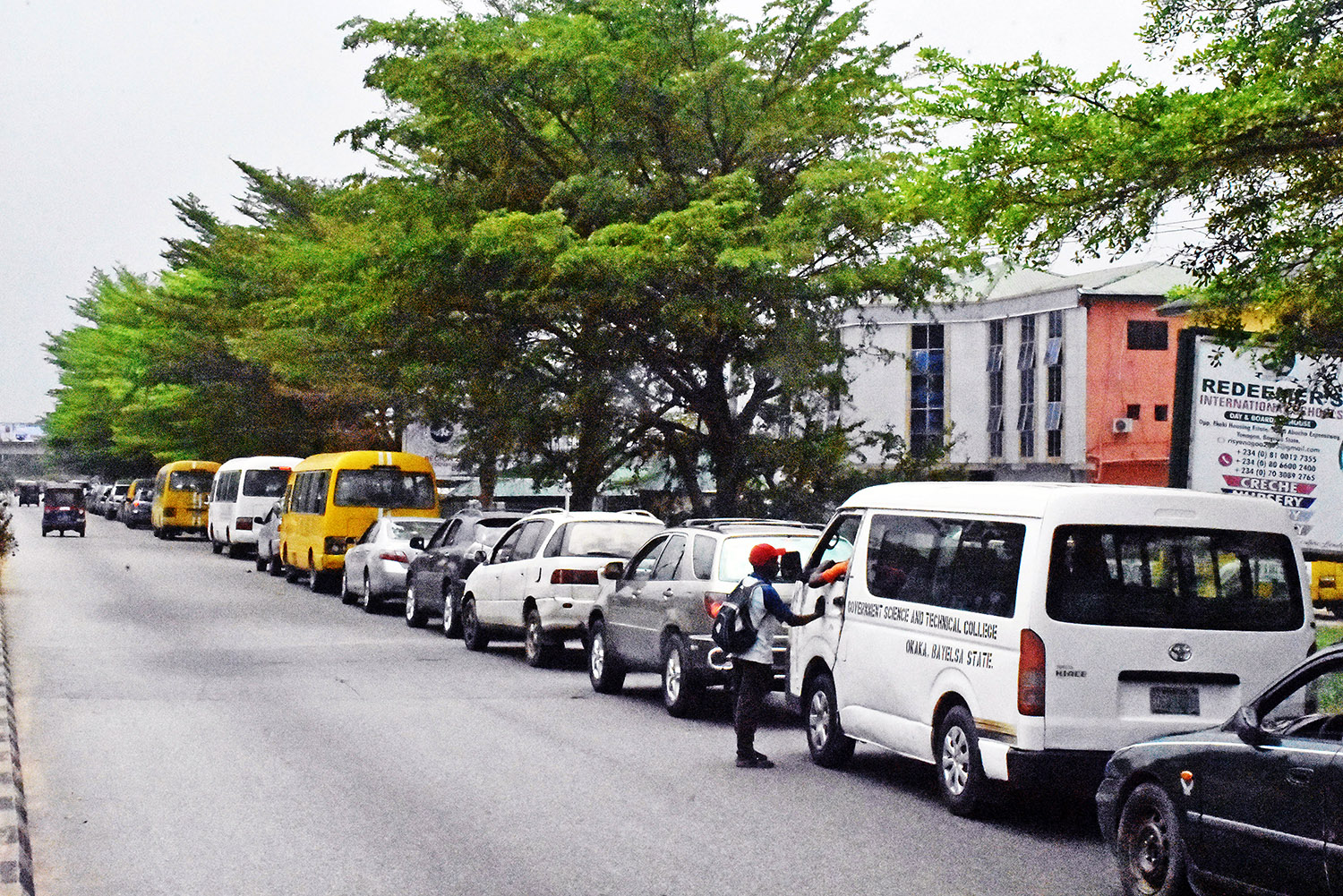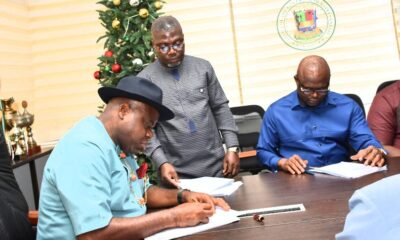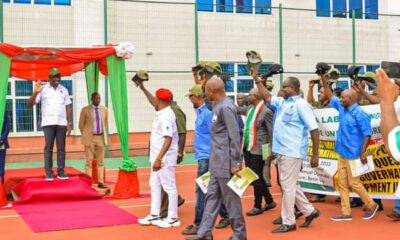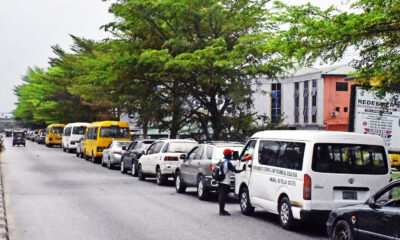Business
Boosting Nigeria-Poland Trade Relations
Until very recently, many Nigerian entrepreneurs were more comfortable doing businesses with West European countries, to the virtual exclusion of the East European nations which operated closed economies.
The reasons were not far-fetched! Effectively from 1945 when World War 11 ended, the famed Cold War — a period of the great ideological conflict between the West and East blocs — set in.
As a consequence, most countries in Eastern Europe were locked away behind the Iron Curtain, while operating closed and centralised economies that were unique to communist nations of that era.
With the end of the Cold War and the eventual collapse of the erstwhile Soviet Union in the early 1990s, however, the economic equation of Europe began to change.
As at date, many erstwhile East European nations have embraced democratic values of the West and consequently opened up their economies to the world.
Poland is one of such nations, which in 1989 shed its communist toga to embrace the capitalist credo and since then, its economic and political forays have known no bounds.
With a population of 40 million, Poland has thus far undergone a massive socio-political and economic transformation, which has ensured the prosperity of its people in all spheres of human endeavour.
For a visitor to the erstwhile communist enclave, the image of a very prosperous nation is discernible as all major towns and cities exude developmental characteristics.
There are broad roads with alluring greeneries on the sides, gleaming and well-maintained trams, exotic automobiles and fine architectural outlays, which typify the nation’s ancient and modern history.
The citizens also display unusual calmness, which perhaps, underscores their strong sense of security and contentment.
Beyond doubt, the citizens’ determination to rebuild their nation, especially Warsaw – the country’s capital, which was destroyed during World War 11, is discernible to any perceptive observer.
War historians say that Warsaw lost 85 per cent of its original buildings, among them, the country’s Parliament, during the war. Since the end of the war, however, the people have rebuilt the structures, recreating replicas of their original selves.
The Polish Deputy Foreign Affairs Minister, Ms Beata Stelmach, sheds light on the state of the Polish economy, saying that is had grown steadily at the rate of 4.3 per cent annually over time.
She said with some measure of pride that the Polish economy was unaffected by the last global economic meltdown, which pulverized the economies of many nations of the world.
In fact, some economists have said that the Polish economy had grown at such a dizzying pace that the country, which struggled to survive under communism barely 20 years ago, is now the sixth largest economy in Europe, overtaking The Netherlands.
On the political front, Poland is also the current President of the European Union (EU), a feat it could only have dreamt of two decades ago.
Nigeria’s Ambassador to Poland, Ms Asalina Mamuno, praised the growth of the Polish economy when she interacted with some Nigerian journalists, who undertook a study tour of that country between Aug. 28 and Sept. 4.
According to her, the communist Poland the world had known has now become history.
Mamuno insisted that there were vital lessons Nigerian investors could learn from Poland in terms of charting of economic directions, adding that even bigger nations as the U.S. and Russia were already learning some secrets of economic development from the Polish nation.
“Poland has potentials; they are a hard-working people. There is a lot to see here, a lot to learn; they are a talented people. We should have used them to build Abuja.’’
Analysts point to outstanding achievements of Poland in areas as ship-building, railway, alternative and renewable energy, military hardware, tourism and environmental maintenance.
In the construction and agricultural sectors, analysts stress that the Poles have held their own, recalling that a Polish firm – Navimor Invest, with a yearly turnover of over $60 million, built Nigeria’s Nigerdock Shipyard in Lagos in 1986.
Mr Tomasz Marcinkowski, a manager in the company, said that his company was also into hydro-technical construction and the development of power plants, seaports, cement pontoons and harbours, among others.
He bemoaned that Polish entrepreneur largely lacked information on business opportunities in Nigeria, even though they were quite willing to come over to do businesses.
Equally noteworthy is the interest picked in the Nigerian market by a Polish military hardware company — Bumar Group, considered the biggest military hardware company in Europe with a 40-year track record of operation.
Officials said that the group was interested in working with Nigeria’s Defence Industry Corporation (DIC) in the areas of technology.
Nigeria is on record to be Poland’s largest trading partner in West Africa and second in Africa but Mamuno insists that trade relations between the two nations, which began in the 1960s, was still at low and unequal ebb of 90 to 10 in favour of Poland
“Economically speaking, not much success has been recorded between Poland and Nigeria in the area of trade and investment but there are lots of areas we can explore, especially in agriculture.
“They have a good farming scheme and since agriculture is important to our transformation agenda, I think we can engage the Poles. ’’
She identified alternative energy sourcing as another area where Nigerian businessmen could key into the Polish expertise so as to regenerate the nation’s energy sector.
“Ninety per cent of Poland’s power is derived from coal; they also have a clean development mechanism, a technology that can reduce environmental pollution caused by coal. ’’
Mamuno said that some Polish investors had already shown interest in the use of Nigeria’s palm kernel as a renewable energy source — a move she described as a positive development.
A top official in the Polish Foreign Affairs Ministry also hinted that Poland was considering buying Nigeria’s coal to power the country’s energy facilities in a deal that could last for 10 years initially.
Stelmach said that Poland, on its part, would be willing to assist Nigeria in solving its power problems once both countries fostered their relationship.
“There is a need for study tours for businessmen as well as workshops and seminars. I will be satisfied if more companies from Nigeria come to Poland; there will be no obstacles to such initiative. ’’
The Polish Ambassador to Nigeria, Mr Przemyslaw also stressed the need for entrepreneurs of both countries to synergise. An immediate action in this direction, he said, was the simplification of visa procedures at both ends.
Niesiolowski said that the Polish embassy would not place any obstacles on the way of genuine investors and businessmen, saying: “If we meet such reliable people, we can hook them up with reliable partners. ’’
He recalled the participation of six Nigerian businessmen in the Polish International Trade Fair in Warsaw recently, describing it as a promotion of “people-to-people diplomacy’’ — a key component of trade relations.
From Nigeria’s end, Mamuno stressed the need for businessmen to always liaise with the nation’s embassies and missions abroad once they desired to undertake any international business deals.
“Most times, once people get their visas, they embark on business trips and deals privately without consulting us but when they go wrong, they start coming to the embassy for assistance. ’’
Observers say that while the consolidation of trade relations between both nations is imperative, there is, however, the need to engender thrust between the peoples, while economic information data base must be readily available.
Mr Marek Zelazko, Head of the Polish Chamber of Commerce, decried the lack of business contacts and platforms where businessmen could interact and exchange ideas and initiatives.
Zelazko underscored the necessity for a renewed partnership agreement, to be signed by both countries, which would be an improvement on an earlier one signed in 1998 by his association and the Nigerian Association of Chambers of Commerce, Industry, Mines and Agriculture (NACCIMA).
“The agreement was not fruitful to both countries; there is need to resuscitate the agreement by way of developing people-to-people diplomacy as it is the main force that will drive the framework. ’’
He also suggested the establishment of a Poland- Czech Republic-Nigeria Tripartite Joint Commission to promote economic co-operation among the three nations.
According to him, regional co-operation will expand investments and open up new market opportunities.
On his part, Alhaji Umar Gambo, a Nigerian businessman, who also does business in Poland, stressed the need for creation of increased awareness so as to properly educate businessmen on the opportunities that abound in both countries.
Gambo, who deals in technology systems, decried the low level of trade between Nigeria and Poland and urged the Nigerian government to take the lead in facilitating the international trade relation.
Apparently mindful of these viewpoints, the two countries have begun work on a Memorandum of Understanding (MoU) to guide economic relations between them.
Mamuno said that Poland produced the draft document while Nigeria was still evaluating the contents so as to harmonise issues for mutual benefits.
In what appears to be a determined effort to promote Nigeria’s international trade relations, the Federal Government recently established trade desks in all its embassies and missions abroad.
The objective, officials say, is to fill any information vacuum and offer potential investors in foreign lands details of business and investment opportunities which abound in the country.
Economic analysts say that while this measure is commendable, government must ensure that the desks are well funded, to enable them effectively discharge the mandate for which they were established in the first instance.
They insist that the funding must be prompt and adequate to save the desk officers from the financial embarrassments faced by some foreign mission staff lately due to the inadequacy of funds to operate effectively.
Salihu is of the News Agency of Nigeria (NAN)
Habiba Salihu
Business
Fuel Scarcity: IPMAN threatens shutdown over bridging claims

The Independent Petroleum Marketers Association of Nigeria (IPMAN) Depot Chairmen Forum, has exonerated its members from the current fuel scarcity in the country.
According to IPMAN, this is caused by its inability to source petroleum products.
The IPMAN Depot Chairmen Forum also threatened to withdraw its services over non-payment of N200 billion bridging claims by the Nigerian Midstream and Downstream Petroleum Regulatory Authority (NMDPRA) to its members, since 2022.
Alhaji Yahaya Alhassan, the Chairman, of the Forum said this while briefing newsmen in Abuja, yesterday.
Alhassan said the Nigerian National Petroleum Company Limited (NNPC Ltd.) was the sole importer of the product, but the marketers could not source products from NNPC Ltd. deport, rather from the private depots at high rate.
“We cannot buy fuel from the private depots at N950 and transport the product from Lagos to the North and other parts of the country with N2 million and still sell it at N900 or N1, 000.
“It is expedient for us to state that we are more pained by the non-availability of petroleum products in the country, which has given rise to another round of untold hardship for Nigerians.
“Contrary to claims that IPMAN members are hoarding Premium Motor Spirit (PMS) known as fuel, we would like to categorically state that PMS scarcity is wholly triggered by inability to get fuel from NNPC and not IPMAN,’’ he said.
Meanwhile, the NNPC Ltd. Chief Corporate Communications Officer, Olufemi Soneye said the disruption was due to logistical issues which had since been resolved.
“We currently have an availability of products exceeding 1.5 billion litres, which can last for at least 30 days. Unfortunately, we experienced a three-day disruption in distribution due to logistical issues, which has since been resolved.
“However, as you know, overcoming such disruptions typically requires double the amount of time to return to normal operations.
“Some folks are taking advantage of this situation to maximise profits. Thankfully, product scarcity has been minimal lately, but these folks might be exploiting the situation for unwarranted gain,’’ Soneye said.
He however, said the lines would clear out soon.
On the non-payment of bridging claims, the IPMAN forum said it was distressed and depressed by the laidback attitude of the NMDPRA towards the survival its member’s businesses, arising from its refusal in paying the claims.
“It is with deep frustration that we have assembled here today as the IPMAN Depot Chairmen Forum. It is also disheartening to note that some of our members have completely shut down businesses and retrenched employees.
“As businessmen and women, our members acquired bank loans to keep their fuel retail outlets running on a daily basis across the nooks and crannies of Nigeria in order to serve the teeming population of Nigerians,’’ Alhassan said.
He recalled that Sen. Heineken Lokpobiri, Minister of State Petroleum Resources (Oil), at a stakeholders meeting in February mandated the NMDPRA management to clear the entire debt in 40 days.
“However, today, we have crossed the 40 days’ time lapse given to the NMDPRA to clear the debt, and it is shameful to state that only the paltry sum of N13 billion has been paid, ignoring minister’s directive.
“We are not happy with the indiscriminate increment in the issuance and renewal of Sales and Storage Licence, by the NMDPRA, and the subsequent delays in acquiring the licence, which our members are recently subjected to.
“We are also calling on President Bola Tinubu to look into this unwholesome figure which is highly detrimental to our business and reverse it forthwith, as it is bound to impact negatively on the masses.
“We are poised to take far reaching decisions that may cripple the supply and sales of petroleum products across Nigeria if our demands are not met within the shortest period of time.
“We are collectively prepared to withdraw our services, shut down every single outlet, and suspend lifting of products forthwith till our demands are fully met, and the consequences will be terrible.
“We call on our members to however remain resolute and law abiding, even as we draw close to the immediate ultimatum for our demands to be met by the NMDPRA,’’ the chairman said.
Reacting to the IPMAN’s claims, the Acting Head, Corporate Communications, NMDPRA, Seiyefa Osanebi said the bridging claims payment was ongoing.
“The bridging claims payment is always an ongoing process,” she said.
Maritime
Shippers’ Council Registers 160 Port Operators

The Nigerian Shippers Council (NSC) says it has registered 160 Port stakeholders into its Regulated Port Service Provider and Users platform since the initiative began in 2023.
Executive Secretary, NSC, Mr Pius Akutah, made the disclosure on the sideline of a sensitisation programme by the commission for port operators in Lagos, with the theme, “Regulated Port Service Provider and Users”.
Represented by the Director, Consumer Affairs, Chief Cajetan Agu, Akutah emphasised the significance of the programme for stakeholders.
He said the sensitisation programme was the second edition after its commencement during the last quarter of 2023.
The Secretary said the 160 registered port operators consist of agencies, terminal operators, shipping companies, individual port users as well as service providers.
“We invited the ports stakeholders for enlightening them on the processes for online registration of Regulated Port Service Provider and Users.
“We have demonstrated to them how to register and how to make payment and we were able to present before them the various categories of the registration.
“The rate of payment is also in the registration. The payment of each group depends on the operation. A shipper pays N30,000, terminal operators and shipping companies pay N300,000, truckers also pay N30,000, while some pay N50,000 and N100,000.
“The Council was able to intimate them on the benefits, because port users benefit more as we help to interface on reducing port charges from time to time”, Akutah said.
He said that there was a need to continue to work with port operators to stop delays and eliminate high costs to make the port efficient.
Also speaking, the Deputy Director, Stakeholders, Service, NSC, Mr Celestine Akujobi, said “the sensitisation exercise was important for the council to enable us bring all the port stakeholders together”.
According to him, this is to avoid challenges during the implementation of the council’s responsibilities.
“By the time we introduce sanctions on defaulters, no operators will complain that he or she is not aware of the registration.
“I’m happy with the turnout of this sensitisation. This shows that the operators are well informed of the statutory friction of the council as the port regulator.
“The final implementation will commence as soon as we discover that all the operators have keyed into the portal.
“We are engaging other ports across the country and we’re hopeful that before the last quater of 2024, the council will implement sanctions on defaulting operators”, Akujobi said.
Earlier, Vice Chairman, National Association of Government Approved Freight Forwards (NAGAFF), Dr Ifeanyi Emoh, said port challenges were enormous, adding that they originated from some of the government agencies.
Emoh urged the council to look into regulating other government agencies, so that there could be a window through which they can collect port charges collectively instead of indiscriminately.
By: Chinedu Wosu
Business
Chivita, Hollandia Reward Outstanding Trade Partners At Annual Conference

Chivita| Hollandia (CHI Limited) leading fruit juice and value-added dairy manufacturer in Nigeria has rewarded its long standing distributors at the recently held 2024 Distributor Conference. The event with the theme, “Break Boundaries Exceed Expectations” served as a platform to recognise and reward the exceptional contribution of the distributors and wholesalers who play a critical role in Chivita|Hollandia (CHI Limited) success and business goals for the year.
The Distributor Conference was held in two sessions. While the morning session featured keynote addresses, industry insights and brand immersion experience, the evening session was a cultural display of elegance and funfair that culminated in the award presentation and recognition of the contribution the trade partners made to the company in the 2023 year under review.
A key highlight of the event was the award ceremony which acknowledged outstanding trade partners in various regions across the country. The awards recognized commitment, dedication, and outstanding performance in areas of sales growth, brand promotion, and market expansion.
Eelco Weber, Managing Director, Chivita|Hollandia (CHI Limited), stated that the company’s success story is incomplete without the strong partnerships it has built with trade partners. “Today, we celebrate not only the achievements, but the collaborative spirit that has made our growth possible” he said.
Bola Arotiowa, Chief Commercial Officer, Chivita|Hollandia (CHI Limited), in his statement revealed that, the event which was first of its kind will continue to be an annual meeting to enable the company work more closely with its distributors, share insights and action points, help the trade partners familiarize themselves with the company’s goals and objectives for each year, and serve as a driver for mutual success.
“Our distributors are the backbone of Chivita|Hollandia (CHI Limited). Their relentless efforts in distributing our products, promoting our brands, and expanding our reach across the nation is truly commendable. As the bridge between us and our valued consumers, it is very important to reward their hard work and dedication for being an essential part of the Chivita|Hollandia (CHI Limited) family. Together, we will continue to deliver great products to our conusmers which in turn will deliver value to them”, Mr. Arotiowa added.
Speaking at the conference, HajiyaBilikisuSaida, Chief Executive Officer of Smabirm Nigeria Limited, who won the Outstanding Distributor of the Year in North 1 region, and got a reward of two million Naira worth of Chivita|Hollandia (CHI Limited) products expressed delight at the company’s recognition, and stated that the awards served as a way to inspire distributors to do more and put in more effort, which in turn would help both the distributors and the company to grow.
Other outstanding performance distributors of the year rewarded with a two million Naira worth of Chivita|Hollandia (CHI Limited) stock include, Sunny Chuks Limited for East 1 region, MRS FA & Sons Limited for East 2 region, Hussakas Ventures for North 2 region, Rookee 1388 Ventures for Lagos 1 region, Pik N Pil Ventures for Lagos 2 region, FaithJoe Event Management Limited for West 1 region, and Progress Family Nigeria Enterprise for West 2 region.
The annual Distributors Conference aims to strengthen the bond between Chivita|Hollandia (CHI Limited) and its trade partners. This collaborative approach fosters mutual growth and ensures the continued success of the brands in the Nigerian market.
-
News3 days ago
Drama As Senators Jostle For Seats In Newly Renovated Chamber
-

 Niger Delta3 days ago
Niger Delta3 days agoDiri swears in 14 Commissioners, Revenue Chairman
-

 Nation3 days ago
Nation3 days agoVCDF in Partnership with LDSVA Sensitise Women on Gender Equality, Financial Literacy & Entrepreneurship
-

 Niger Delta3 days ago
Niger Delta3 days agoObaseki Approves N70,000 Minimum Wage For Workers
-
Niger Delta3 days ago
Ministry Of Health Decorates Odu As End Malaria Champion In Rivers
-

 Niger Delta3 days ago
Niger Delta3 days agoGroup Dismisses Call For NDDC MD’s Sack … Passes Confidence Vote.
-

 Business3 days ago
Business3 days agoFuel Scarcity: IPMAN threatens shutdown over bridging claims
-
Niger Delta3 days ago
Court Exonerates Ekpeye Monarch, 42 Others From Murder Of Ahoada DPO

